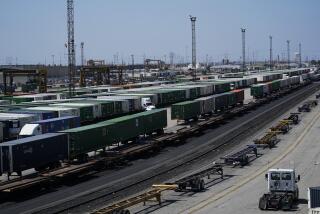Probe of BART worker deaths spurs ‘urgent’ safety recommendations
SAN FRANCISCO -- The National Transportation Safety Board on Thursday issued “urgent” safety recommendations to the Federal Transit Administration as part of its ongoing probe of the deaths of two Bay Area Rapid Transit track workers struck by a train in October.
[For the record, 4:39 p.m. PST, Dec. 19, 2013: A previous version of this post incorrectly said the workers were struck last month.]
Thursday’s letter to FTA Administrator Peter M. Rogoff urges him to issue a directive to all rail transit agencies nationwide to require “redundant protection” for railway right-of-way workers. Examples include slowing or stopping of trains, secondary warning devices or the use of a “shunt” —a safety device that workers attach to rails that results in approaching trains receiving a stop signal.
The letter from NTSB Chairwoman Deborah A.P. Hersman also presses for a directive that would require transit agencies to review track worker rules and procedures and eliminate “any work authorization that depends solely on the track worker to provide protection from trains and moving equipment.”
Killed on the tracks in Walnut Creek, Calif., during a mid-October regional commuter rail strike were Laurence Daniels, 66, who worked for a private contractor, and Christopher Sheppard, 58, a BART employee. They were investigating a dip in the track when struck by the BART train, which was training managers as drivers in the event of a protracted strike.
The workers were operating under a system known as “simple approval,” which granted them authorization to be on the tracks while making them entirely responsible for their own safety. Under the system, workers were to look out for trains and “provide their own protection and not interfere with mainline/yard operations.”
BART eliminated the practice within days of the Oct. 19 deaths, replacing it with a policy that requires train operators or drivers to slow to 25 mph and be prepared to stop when approaching workers on or near the tracks.
“Having redundant protection measures in place for track workers is not only a best practice but common sense,” Hersman said in the statement. “A positive safety culture is not a solo act -- everyone needs to look out for each other.”
In addition to the BART deaths, the letter to Rogoff referenced three track worker fatalities on Washington Metropolitan Area Transit Authority lines, a fatal incident on the Massachusetts Bay Transportation Authority lines, and another earlier this year involving a track worker for Metro-North Railroad.
“The NTSB believes that all rail transit systems are at risk for roadway worker fatalities and serious injuries,” the letter said.
The BART accident is still under investigation and the cause is yet to be determined.
ALSO:
This is why Los Angeles’ sunsets have been so dramatic
Volunteer seeks pet beds for L.A. shelter during the holidays
Lakewood woman receives implant device to prevent epileptic seizures
Twitter @leeromney
More to Read
Sign up for Essential California
The most important California stories and recommendations in your inbox every morning.
You may occasionally receive promotional content from the Los Angeles Times.











